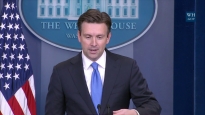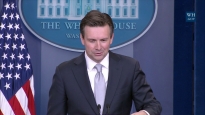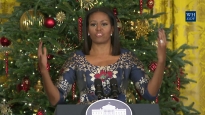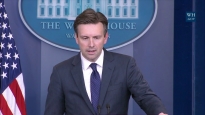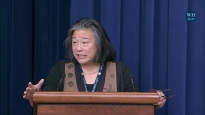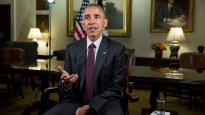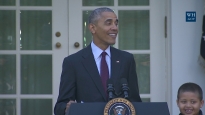Press Briefing 5/27/09
May 27, 2009 | 45:09
White House Press Briefings are conducted most weekdays from the James S. Brady Press Briefing Room in the West Wing. (public domain)
Download mp3 (41.4MB)
Briefing by White House Press Secretary Robert Gibbs, 5/27/2009
THE WHITE HOUSE
Office of the Press Secretary
____________________________________________________
For Immediate Release May 27, 2009
____________________________________________________
For Immediate Release May 27, 2009
PRESS BRIEFING BY
PRESS SECRETARY ROBERT GIBBS
James S. Brady Press Briefing Room
1:24 P.M. EDT
MR. GIBBS: Good afternoon. My condolences to all of you that weren’t allowed to go to Las Vegas and Los Angeles, including myself. Let me get organized here.
Mr. Feller.
Q Thanks, Robert. Two questions on the Supreme Court, please. As expected, the debate to try to define Judge Sotomayor is underway from interested parties from the left and from the right. The President obviously had his say yesterday to the American people, but I'm wondering, as this debate unfolds and heads towards confirmation, what is the White House's plan today, every day, to try to influence the debates, to try to make sure your message stays out there?
MR. GIBBS: Well, look, as I said yesterday, Ben, I think the most effective advocate for making the case for the confirmation of Judge Sotomayor is, in fact, Judge Sotomayor. She's begun reaching out to senators, talking on the phone today with Senators Reid -- Senator Reid, Senator McConnell, Senator Leahy, and Senator Sessions. We're working on a readout of those calls. I don't have that handy at the moment.
We anticipate that -- (cell phone rings.)
Q That's her now. (Laughter.)
MR. GIBBS: Right, calling one of you weighty senators to weigh in on her confirmation. We expect that as the Senate comes back next week, she'll begin visits up on Capitol Hill. And as soon as we get scheduling information we'll certainly let you know that, as well.
But then, again, I think that this is somebody who brings, as I said yesterday, a richness of experience -- 17 years on the federal bench -- and that if people take an objective and fair look at her record, we think they'll come to the conclusion that she's highly qualified to be a member of the Supreme Court.
Q That plan that you just laid out of the Judge herself talking to senators, obviously that happens in a private setting. Meanwhile the debate is happening that the American people are going to be hearing about -- so does the White House have a role in that debate?
MR. GIBBS: Look, I think we'll probably find a way to make it easier on you to find legal experts and her colleagues that share the President's enthusiasm about the pick. I don't doubt that we won't do that. I mean, I think it's -- I think that we'll certainly play a role in that. I think, again, our strong belief is that she has a record that speaks highly of who she is as a judge.
Q One more on that, if I could. You made a comment yesterday, "I think the President picked the person he believed best suited for the job at this time." And in his C-SPAN interview a few days ago, the President said, different times call for different justices, and he mentioned the civil rights movement in particular in that comment. So I'm wondering, what is it specifically about this time that makes Judge Sotomayor the right pick? What does the nation's current state have to do with it?
MR. GIBBS: Well -- and I don't necessarily mean that in relation to six months from now would he have picked somebody else. I think what he got in the pick of Judge Sotomayor, as I said yesterday, was somebody who brings a wealth of experience. The President was impressed with her approach to judging and a compelling life story that I think underscores the President's desire to have somebody that understands the role the Supreme Court plays in the everyday lives of the American people and looking for somebody to bring their common sense and that perspective to the Court.
Yes, sir.
Q A couple of questions, first on North Korea. What's the administration's reaction to North Korea's threat to attack South Korea after it said it would join a U.S.-led plan to check vessels suspected of carrying materials that could be used for weapons of mass destruction? And is the U.S. taking any precautions, militarily or otherwise, to cope with this?
MR. GIBBS: I don't have any information on any military precautions. I would say this: that threats are not going to bring -- threats won't get North Korea the attention it craves. Their actions are continuing to further deepen their own isolation from the international community and from the rights and obligations that they themselves have agreed to live up to. As an example, I think a rough count -- this is the fifth time in 15 years that they've sought to nullify the armistice governing the Korean War. And I think their actions would be better focused on living up to their rights and obligations.
Q Are you saying you're not really taking the threat seriously?
MR. GIBBS: No, we're certainly concerned and take any threat seriously. But my sense is they're trying to get renewed attention through saber rattling and bluster and threats, and I think the attention they're trying to gain is not going to be successful, given what they're trying to do.
Q And another subject, oil prices have doubled over the last six months. The Saudi oil minister said today that the global economy could -- was strong enough to cope with oil prices of $75 to $80 a barrel. What's the administration's reaction to that? And is there any concern in the administration that rising oil prices could derail any economic recovery?
MR. GIBBS: This is something that the administration obviously watches, but I don't have anything directly on the $75 -- look, obviously the President is concerned about anything that raises the cost of living in a fragile economic time. I think it underscores again the President's call and commitment to greatly reduce our dependence on foreign oil. I think one of the steps that was taken in the last couple weeks were renewed and strengthened fuel mileage standards. And obviously legislation is working its way through Congress that would further decrease that dependence on foreign oil, and we'd certainly like to see that pass.
Q Will the President be speaking to King Abdullah of Saudi Arabia next week about keeping oil prices reined in?
MR. GIBBS: I can only imagine that will be a topic, yes.
Yes, sir.
Q A couple questions, Robert. First of all, a lot of public officials have been complaining that the stimulus dollars just aren't getting out to the states and cities quickly enough. In addition, the President made a pretty big deal about going to Columbus, Ohio, and talking about the stimulus dollars saving some cadets jobs. But now Columbus is talking about raising taxes from 2 percent to 2.5 percent, and if they don't get this additional revenue they're going to have to lay off some of those cadets specifically. And I'm wondering if you think that in any way you guys oversold, or the American people got a misimpression about how quickly the stimulus was going to take effect.
MR. GIBBS: No, in fact, I think you guys asked me about why only 75 to 80 percent of it would be spent in two years, right? So, look, our focus is on trying to get as much money out the door as quickly as humanly possible while ensuring that there isn't waste; that projects that don't need to be funded take up money that can and should be going to other projects.
I think -- and I don't have some of the numbers in front of me, but we've funded thousands of road projects that will create jobs. The President has -- a lot of money clearly has gone out the door to states and localities dealing with things like unemployment insurance, which are tremendously important right now.
There is no doubt that many states across the country are facing increasingly difficult economic times. The President understands and is aware of that. One of the reasons that we had an increase in money going directly to those states was to try to help those problems.
In terms of the police in Columbus, the President remains committed to that. We've actually -- there's certainly money in the budget to continue to hire police. But we also understand the stimulus, the recovery plan is a temporary infusion of money into the system. There are long-term budget problems in states and localities that are certainly going to have to be addressed. We're monitoring those. The President is doing, and the administration continues to do all that they can to get money out as quickly as humanly possible.
Q Okay. And just a separate question. Today in California, Ted Olson, former Solicitor General for President Bush, and David Boies, are introducing a lawsuit against the state of California, saying that by denying same-sex couples the right to marry, the ability to marry they are violating the Equal Protection Rights under the U.S. Constitution for same-sex couples. Why are they wrong?
MR. GIBBS: I have not read the opinion or --
Q The President supports the idea that people should be able to -- same-sex couples should be able to enter in civil unions. Boies and Olson -- a very conservative lawyer -- are saying that is a violation --
MR. GIBBS: Olson. (Laughter.)
Q Not Boies, right -- Olson, a very conservative lawyer, saying that is a violation of the Constitution. It is also the position the President holds, that there should be civil unions, not same-sex marriage. Why is it not a violation of the Equal Protection clause?
MR. GIBBS: Jake, let me have somebody take a look at the pleading that they're going to make. I don't know what they're arguing --
Q Generally. Just forget the specific argument; I'm just talking about their general argument is that by having -- by not allowing same-sex couples to marry, it is a violation of equal protection.
Q Generally. Just forget the specific argument; I'm just talking about their general argument is that by having -- by not allowing same-sex couples to marry, it is a violation of equal protection.
MR. GIBBS: Right, well, again --
Q And that's the President's position, so --
MR. GIBBS: But let me -- well, the President's position, we're all aware of. I hesitate to be general about the legal underpinnings of an argument based on some portion of the Constitution. I think that they may be somewhat hard to generalize. So let me have somebody take a look at that and see if we have anything based on what Mr. Olson and Mr. Boies are doing.
Yes, sir.
Q Is the administration -- towards North Korea now -- is the administration frustrated at all that North Korea doesn't appear to be intimidated by the global reaction to their test firing of missiles and their nuclear --
MR. GIBBS: That they're intimidated?
Q Yes, that they don't appear to be intimidated by this. They keep doing these tests. Is there any frustration at all from the administration that --
MR. GIBBS: I think there's a frustration that the North Koreans don't seem to want to live up to the obligations that they've previously made to the international community, and I think the international community has spoken out swiftly about that. You guys all covered when -- around our first trip, their test, and whether or not you could get the Security Council to make a decision to pass some resolution. The unified international condemnation of this came fast and furious.
But again, I think, and I think the vast majority of our allies strongly believe, that what North Korea is doing is hurting North Korea; that they're -- I can't speak to what motivations they have, except the fact that it underscores the deepening of their actions in isolating themselves from the rest of the world. I think that's apparent each and every day.
Q And is there a sense that North Korea will back down before this escalates any further?
MR. GIBBS: Well, I think we are, again, strongly hopeful that they'll understand that this is not doing them any good, that it further isolates themselves; they further -- they're further -- they're farther and farther away from living up to the obligations that they themselves set. And we continue to look at ways to ensure through the access of infrastructure, either banks or ports, that we're doing, and our allies are doing, all that we can to ensure that they're not moving material that could be used to produce a weapon of mass destruction.
Yes, sir.
Q Two things; first, GM. Recently, when Chrysler was front and center, the President singled out investors as one of the causes of that bankruptcy. He said, "It was unacceptable to let a small group of speculators endanger Chrysler's future by refusing to sacrifice." Does the President consider GM bondholders to be speculators who refuse to sacrifice? Does he see them in the same light?
MR. GIBBS: Well, Chip, as you know, there is a looming deadline that the President and his task force set for GM to enter into a restructuring agreement that creates the path towards a viable auto company. That deadline is looming. But as I said yesterday I don't want to get involved in the day-to-day negotiations from up here.
Q This is more than a negotiation. I mean, the bondholders are not playing ball here, just as the speculators did with Chrysler. Does he seem bothered --
MR. GIBBS: Well, again, I think the statement --
Q -- refusing to sacrifice the way the speculators did?
MR. GIBBS: Well, I do think -- well, two things. I do think --
Q Are they the bad guys?
MR. GIBBS: I do think the President strongly believes that, as he said in the lead-up to the Chrysler deadline, that all the stakeholders involved -- the company, labor, management, bondholders, debt-holders -- were all going to have to make some sacrifices if we're going to see GM continue.
I would also point out, I think, Chip, that statement came at a point in which the vast majority -- I think it later became public that basically the people that were holding out sort of vociferously represented far less than 5 percent of the company. Instead of prejudging how the negotiations will go over the course of the next several days as we lead up to that deadline, I'd let those stakeholders continue that negotiation in order to get the best possible outcome for GM, for its workers, for the communities that GM is in, and for the taxpayers of this country.
Q So he doesn't see them in the same light, the bondholders and GM, in the same light that he saw the speculators in Chrysler?
MR. GIBBS: Again, you're talking about a statement that -- you're talking about holdouts when, again, probably 97 or 98 percent of the people had an agreement. We're working towards -- our hope is an agreement with all the stakeholders involved to continue General Motors, and I think we're making progress and hopefully we'll have news to report soon on that.
Q And are you familiar with -- switching topics for a moment to Sotomayor -- are you familiar with Newt Gingrich's blog -- (laughter.) You are not?
MR. GIBBS: No.
Q Okay. Well, he apparently -- I'm told it is on his blog that he said, "Imagine a judicial nominee said 'my experience as a white man makes me better than a Latino woman.' Wouldn't they have to withdraw? New racism is no better than old racism. A white man racist nominee would be forced to withdraw. A Latino woman racist should also withdraw."
MR. GIBBS: Well, I think it is probably important for anybody involved in this debate to be exceedingly careful with the way in which they've decided to describe different aspects of this impending confirmation. I think we're satisfied that when the people of America and the people of the Senate get a chance to look at more than just the blog of a former lawmaker --
Q He also tweeted us. (Laughter.)
MR. GIBBS: -- that they'll come to the same conclusion that the President did: that judicial experience that exceeds any nominee -- federal judicial experience that exceeds any nominee for a hundred years, strict adherence to precedent -- I think when people get a chance to look at her record, I feel certain that partisan politics will take a backseat to common sense and open-minded decisions based on a full examination of the record. And I think that's what every Supreme Court and every judicial nominee deserves.
I think if you look at -- again, I mentioned this yesterday -- this is somebody who was appointed by George Herbert Walker Bush and Bill Clinton, approved by the Senate in each occasion. So I think she is somebody who is highly qualified, of keen intellect, and somebody that's going to be a great member of the Supreme Court. I've heard a lot of people in the last couple days, they've mentioned intellect. I'm not entirely sure where people that make that argument -- I'm not sure what number they graduated in their class at Princeton, but my sense is it's not second.
Yes, sir.
Q The President moves on to Los Angeles today, where he hosts a fundraiser where the top price is up to a reported $30,000, at the Beverly Hills Hilton or at one of the Beverly Hills hotels. A congressman from the Central Valley of California, Jim Costa, says, "The President is not feeling any empathy towards me. He promised he would visit the California heartland. He's not doing that. He's merely attending a fundraiser here." Is the President taking California for granted politically?
MR. GIBBS: I don't see how that would be the case. We've certainly -- I don't know how many days we spent out there earlier on a I think a two- or three-day trip. I can't -- I didn't go on that one either; I seem to miss out on --
Q But today's context includes the financial crisis there and the controversy over Proposition 8. The President, as far as we know, is not going to speak out on any of these issues while he's in California. Do you think that's appropriate?
MR. GIBBS: Well, let's try not to mix up the questions here and let me see if I can keep them straight. I think the notion that the President isn't concerned about the economic conditions of this country I don't think holds a lot of validity, given the actions that he's taken to get our economy moving again; to get the resources that California needs to invest in their infrastructure and to take care of their citizens; to ensure that kids have health care. I think he's taken steps to do that and I think most people in California are confident in that, as well.
Jonathan.
Jonathan.
Q A couple questions, one on the Court and one on North Korea. On North Korea, the Moscow summit is a little more than a month away; that was supposed to show progress on the President's very ambitious arms control agenda that was laid out in Prague. Part of that was supposed to be some movement on the Comprehensive Test Ban Treaty and movement ahead of the nonproliferation treaty meetings next year. And I wonder what impact a nuclear test is going to have on movement on those two issues. Is it going to undermine progress on the test ban and on the nonproliferation treaty, or somehow will it redouble efforts?
MR. GIBBS: Well, I think it gives the entire world the unique opportunity to take the strong steps that the President has outlined. I think we're all keenly aware of what's involved and the stakes that are involved, and I know that the team continues to work ahead of the Moscow summit in order to make progress on these issues. And I think they're working toward that.
Q Do you have a time -- I mean, is there any thought of submitting the CTBT to the Senate --
MR. GIBBS: Let me check with NSC guys on that.
Q Okay. And then on the Court, President Bush would routinely bring in outside people, greybeards, sherpas, to chaperone his nominees around the Senate. What makes you guys seem so confident that you don't feel like you need that kind of team working for Judge Sotomayor?
MR. GIBBS: Well, the absence of a certain colored beard I don't think denotes a casualness about which we're going the confirmation process. Obviously the team is -- there's a team here that's very involved in this. I will check the color of their facial hair at the conclusion of this briefing; I don't think Mr. Klain grew one overnight.
But there are people in the Counsel's office, people that are in the Vice President's office, the West Wing, that are working on this. We're not -- I don't think you could look at what happened yesterday and say that we're taking any of this lightly.
Yes, sir.
Q Robert, does the President know for a fact that Judge Sotomayor supports the ruling in Roe v. Wade?
MR. GIBBS: As I said yesterday, Mark, the President doesn't have a litmus test and that question was not one that he posed to her.
Q Didn't he make that a campaign promise, that he would appoint justices who support --
MR. GIBBS: I'd have to look -- I don't know whether -- I don't remember exactly what was said on that topic, but I can look that up.
Q Okay.
Q Okay.
MR. GIBBS: Yes, sir.
Q I want to follow up on Matt's question. When he meets with King Abdullah next week, you said that he'd -- you would imagine that oil would be on the agenda. What would the President ask King Abdullah?
MR. GIBBS: Well, I'm not going to get into the full meeting agenda and all that's going to be said on each side. We'll likely have an opportunity to read out that meeting after it happens.
Q Would he ask for the Saudis to increase --
MR. GIBBS: See previous answer. (Laughter.)
Q Switch to GM. You mentioned, in response to Chip's question, "we're making progress." Isn't bankruptcy a fait accompli?
MR. GIBBS: Well, I think the deadline is near but it's not passed yet. We'll see -- look, there could be, as happened in the case of Chrysler, there could be progress on an agreement with stakeholders leading up to something that might be an eventual bankruptcy.
Q The only thing left was the bondholders and their deadline passed last night at 11:59 p.m.
MR. GIBBS: Well, then I will --
Q There's nothing left -- unless I'm missing something.
MR. GIBBS: Well, you never know. I think that the team continues to work on trying to get all the stakeholders involved to move and make progress and they're going to continue to do that up until that deadline. I don't anticipate that that's going to change at all.
Major.
Q Robert, on autos -- not in the negotiating realm at all, but last week 36 members of the House wrote a letter to the President saying: We're a little concerned that the task force is making decisions that the legislative body also ought to have some role in. They talk about what happened to Chrysler -- this is members of a union who voted to make some sacrifices, yet they found out after the Chrysler deal that their jobs had been terminated. The implications for Chrysler dealerships they say are affecting their constituents.
Can you talk broadly about what it is about the task force that gives it so much legitimate power that members of Congress now wonder if the legislative branch also ought to have a more direct voice and legislative role in as the future of the auto industry is being debated and decided here at the White House.
MR. GIBBS: Well, let's first of all, just for some context, Major, understand that decisions on plant closings and decisions on dealerships are not made by the auto task force or by its members or people that work in the White House. These are decisions that are made by companies about what it is they believe is the best path toward renewed viability for their company. And understand that in the case of Chrysler I think 75 percent of the auto dealers remained open; that encompasses about 87 percent of annual auto sales.
I would say this to any member of Congress and to any member of the public: If it weren’t for the task force on autos, and if it weren’t for the President's intervention, a hundred percent of those dealerships would be gone, a hundred percent of those plants would be closed, and Roger would have just asked me about the liquidation assets of Chrysler, rather than whether or not we're making progress with General Motors.
So, look, Congress certainly is involved in auto decisions obviously as it relates to setting fuel mileage standards that the President worked on last week, as well as proposals to create tax incentives to trade in older cars that aren’t doing as well on fuel mileage, to both increase auto sales and reduce our dependence on foreign oil. But I think the vast majority of members I think are appreciative of the efforts of the task force each and every day in order to keep as much as we possibly can in a viable auto industry here in America.
Q And those lawmakers who would agree with your initial point that the White House has not made decisions on dealerships or union contracts being terminated or kept, they would also point out that the viability standard is set by the task force and decisions flow from that viability standard set here at the White House. Therefore, the White House does have an enormous say, some might say an inordinate say, in things affecting their constituents. And your response to that would be?
MR. GIBBS: Well, I would say that we have a major role to play, and I think we are playing it in a way that is preserving and protecting as many jobs as possible, protecting as many communities as possible, and hopefully restructuring -- working to restructure an auto industry that has fallen on vastly hard times, and that we're doing all that we can to move that in a different direction.
Q To follow up on Chip, briefly, are you saying that there's no racial dimension and there should be no racial dimension interpreted or drawn from Judge Sotomayor's comments made in 2001 at Berkeley -- after she was confirmed both times by the Senate, so the Senate never had a chance to evaluate that, just to point that out -- that there is no racial dimension? Americans who look at that should think, what, if they think that their might be a racial dimension there?
MR. GIBBS: I think, one, I think Americans should read all of what she talked about. Read the full article. I admonished April yesterday for her YouTube clip. Read the whole article, and I think there's --
Q There's a larger contextual point there --
MR. GIBBS: Read a couple of sentences past that and we can certainly discuss that. But more importantly, Major, let's -- as I said to Chip and others, you have somebody with the vast federal judicial experience that she has, not somebody who served on the court for a year or less than a year, but somebody who served on the court for quite some time. I think there's a strong record with which to evaluate.
I think we can all move past YouTube snippets and half-sentences and actually look at the honest-to-God record of these nominees -- even as April shakes her head. I think even April will do some due diligence and come to the conclusion that the President came to, that we've nominated somebody that deserves --
Q It's out of her mouth. Those were words that she said out of her mouth. You can admonish YouTube. You can admonish that and talk about her record, but she said these words.
Q Well, I'm just asking you, Robert --
MR. GIBBS: I understand, but I'm asking --
Q I'm just asking you if you want to offer -- as the White House had nominated her -- something that you believe the American public should read into it or evaluate from that statement that they read that we haven't heard from the podium so far. So I'm just offering you the opportunity --
MR. GIBBS: I'm sorry, just tell me the last part again.
Q Something that the White House wants to add to what Americans who may look at that fair-mindedly and say, this sounds to me as if there's a racial dimension to it, and maybe that might trouble them. Do you have anything to add to that?
MR. GIBBS: I think it -- I have confidence in Americans reading not just part of, but the whole statement, and I have confidence in Americans evaluating the full depth of her record and coming to an honest and open-minded conclusion.
Q In all fairness, a follow to that -- it's not just a racial dimension, but it's a gender dimension. And do you at least acknowledge that she did say these words? You're asking us to look beyond.
MR. GIBBS: I can confirm that it appears likely that she intoned both of those sentences, yes.
Q I mean, you're spinning it, trying to make us look at the record. Okay, we look at the record. But we're also looking at her words.
MR. GIBBS: Can I just say -- and I want to make sure that I get this on the record -- looking at the record isn't spinning you, okay.
Q I know, but you're spinning --
Q I know, but you're spinning --
MR. GIBBS: I appreciate that --
Q -- what she actually said.
MR. GIBBS: I'm not spinning what she said. If I'm spinning what she said, April, then you at least have to acknowledge that you're not understanding even remotely the full context of what she said in that debate. Right?
Q I understand it, but I --
MR. GIBBS: No, no, no, no, no. I just want to know, do you believe that in judging eight seconds, or six seconds of what somebody says in a 40-minute clip, you've fully understood and taken into account the full context of what she said?
Q You have to look at the context --
MR. GIBBS: Is that a spin?
Q -- but, yes, as well, you have to also see the words that she said. You have to have a whole --
MR. GIBBS: Well, I feel confident that if you look at the context and then listen to the words, you, your listeners, and everyone that you talk to will have a greater and fuller appreciation for exactly what she said, just as I hope that people don't take a 10-second snippet of what you and I are talking about and form some larger conversation.
Q Robert, some of us have read the entire speech --
Q Thank you.
Q -- and we're wondering if you can explain what she meant. Because some of us who have read the entire, lengthy speech --
MR. GIBBS: And I talked about this yesterday. Let me get
--
--
Q She wasn't saying that a Latina woman judge and a white male judge would have equal views; she said one was better than the other.
MR. GIBBS: Here's what I believe. I think she's talking about the unique experiences that she has. I think the next sentence -- I don't have it in front of me -- I think the next sentence denotes that --
Q We want to get it. (Laughter.)
Q We want to get it. (Laughter.)
MR. GIBBS: I am surprised you don't have it, right, April. Have you -- cue your YouTube up right there on your Blackberry. Again, I think if you look at the totality of this, if you look at the next few sentences, I have every confidence that people will come to the conclusion that -- and again, and look at her whole record.
Q You're not spinning us. We're asking you, spin us. (Laughter.)
MR. GIBBS: I appreciate --
Q Explain what you think she meant.
Q Thank you.
MR. GIBBS: I have done that now --
Q And why there is no racial component to it.
MR. GIBBS: -- I have done that --
Q You dismissed Newt Gingrich as not doing well enough at Princeton or doing as well as Judge Sotomayor at Princeton --
MR. GIBBS: I think -- I don't think --
Q -- and all he's saying is there's a racial component to it, and a fair-minded person could read that and wonder to themselves if there's not a racial component. You deny that. I'm just trying to get an explanation as to why.
MR. GIBBS: Well, I'm saying -- I'm also saying you should read all of it.
Q We have.
MR. GIBBS: I think you should look at the totality of -- (laughter) -- let my look denote that I'm casting doubt on what you just said, April.
Q Have you read it?
MR. GIBBS: I've read most of it, yes.
Q And what conclusion do you draw? And what conclusion does the White House draw?
MR. GIBBS: That she has different experiences than -- she has lived a different life than some people have, based on her upbringing; that she understands that --
Q And it's okay, therefore, to say that that different life could lead you naturally to better conclusions than someone who didn't live that life?
MR. GIBBS: Or you could certainly lead to different conclusions, because we all have perspectives.
Q She said "better."
MR. GIBBS: Again, look at the totality of it. I have confidence that people will come to a reasonable conclusion on this.
Michael.
Q In rolling out this nomination, the President --
MR. GIBBS: I hereby admonish everyone -- okay, I'm sorry -- not just April.
Q In rolling out the nomination, the President and others in the administration have highlighted kind of the Horatio Alger aspects of Judge Sotomayor's life. Why is that important in the upcoming confirmation? And why talk about that so much?
MR. GIBBS: Well, I think -- again, I think it provides -- I think the President talked about, in looking for somebody to fill a seat on the Court, was looking for somebody that had -- when I talk about the richness of experience, I include a life and an upbringing that are different than some people have had. I think that provides a unique way in looking at the world. I think it provides somebody with important perspective.
And I think many people in America can see some part of her -- some part of them in her story; that whether it is coming from lesser means, working hard to get through school, excelling, again, working hard as a prosecutor, as a litigator, becoming -- I forget -- I saw this somewhere, that when President Bush nominated her, I think she was the youngest judge on that -- in that district court. So, look, I think that all of that is not only personally compelling, but I think that does give you a different way of looking at the world.
Q Robert, two questions related to Judge Sotomayor. First, there's just been some commentary that if she's confirmed she would be the sixth Catholic to serve on the Supreme Court. I'm just wondering, did issues of faith come up at all in the President's conversations with her?
MR. GIBBS: I will check. The President had those conversations just with her, and staff wasn't there.
Q Was her religious background given any consideration at all?
MR. GIBBS: Not that I know of.
Q Okay. And then, beyond that, you talked before about getting your message out, and you'll convene six legal experts today, later today, to talk to reporters. Correct me if I'm wrong, but I think that this -- I can't think of another instance where the White House has convened outside experts who haven't -- who don't have a formal advisory role to the President to make your case on a particular issue. And I'm wondering, do you regard this as some kind of political or marketing campaign that you have to sort of convene outsiders to get your message out? What's the reasoning --
MR. GIBBS: Usually you just rely on me to spin people.
Q Right. So now you're bringing in -- bringing in other folks.
MR. GIBBS: Sorry, I had to swerve and just try to go back at April one more time.
No, look, I think that -- I don't think this is necessarily unique. I think we have on occasion provided experts for people to follow up with that share the same viewpoint that the President does on a particular issue. I think it's important that we help you guys find people that have played an important role in her development or in her life or have worked with her, or people that certainly agree with the President's pick.
Q Is this the beginning of the war room?
MR. GIBBS: No -- I think this was asked yesterday -- we don't -- I think to have a war room denotes that we think there's some coming war, and we don't believe that.
Q Robert, can you talk a little bit about the Abbas meeting tomorrow, what's on the agenda and what the White House hopes to accomplish?
MR. GIBBS: I don't have anything more specific than just the continuation of the discussions that the President started at the beginning of the administration -- one of the calls was to Mr. Abbas -- as we continue to go through and talk to leaders in the region that are involved in the very important peace talks. But we'll have a stronger readout on what the President conveys on that tomorrow afternoon after that meeting.
Q It originally was envisioned that you were going to have three meetings. Of course, you had Netanyahu here and you were going to have President Mubarak, who you're not going to see until the President gets to Cairo. Has his absence affected the progress you're making?
MR. GIBBS: I don't believe it has. I mean, obviously, again, it was a very tragic circumstance that led to that. I know the President is anxious to have that meeting, but I don't think that it has materially changed where we are, no.
Q Robert, you promised -- you promised. (Laughter.)
MR. GIBBS: Did I promise? I don't know about that. Let me continue my tour around, and we'll see how I am on my promise.
Yes, sir.
Q Just to follow, would the President like President Abbas to resume peace talks with Israel? And just quickly, does the President believe that China has more leverage to bring to bear on North Korea than it has exerted after previous missile and nuclear crises?
MR. GIBBS: Well, on the first part, obviously we were heartened to hear what Prime Minister Netanyahu said about resuming talks, and we're hopeful that the same goes for Mr. Abbas when we see him on Thursday.
In terms of -- I think the Chinese government has been exceptionally strong in their words of condemnation regarding the actions of North Korea over the past few days. I think many speculated that, both in the previous test a few weeks -- well, certainly in the previous test a few weeks ago, that we would have trouble getting unanimity among the Security Council. That's not been the case, and I think that's because a lot of parties have played important and constructive roles. I think, as was the case in 2006, the Chinese government strongly condemned the actions of North Korea as they continue to isolate themselves.
Q Robert, back on Sotomayor. During the process of vetting and all the papers that the President was given and seen, did he ever, out of curiosity, find himself in disagreement with Justice Sotomayor, and if so, on what cases and in what material?
MR. GIBBS: I didn't go through exactly what material he read with -- on that or what the basis would be. I don't have anything on that.
Q Did he ever express any disagreement with the decisions she made?
MR. GIBBS: He didn't in front of me, but that doesn't mean that he didn't in front of others.
Q Robert?
MR. GIBBS: Lester, I'm a glutton for punishment. (Laughter.)
Q Thank you, thank you very much. Just one question concerning what the President said in his speech on Thursday, and I quote, "I ran for President promising transparency, and I meant what I said. This is why, whenever possible, we will make information available to the American people so they can make informed judgments and hold us accountable." End of quote. Do you remember that statement?
MR. GIBBS: I can confirm that he said that.
Q Good. In consideration of this very good promise of transparency, why can't the President respond to the petition to requests of 400,000 American citizens by releasing a certified copy of his long-form birth certificate listing hospital -- (laughter) -- 400,000.
MR. GIBBS: Are you looking for the President's birth certificate?
Q Yes.
MR. GIBBS: It's on the Internet, Lester.
Q No, no, no -- the long form listing his hospital and physician. (Laughter.)
MR. GIBBS: Lester, this question in many ways continues to astound me. The state of Hawaii provided a copy with the seal of the President's birth. I know there are apparently at least 400,000 people -- (laughter) -- that continue to doubt the existence of and the certification by the state of Hawaii of the President's birth there, but it's on the Internet because we put it on the Internet for each of those 400,000 to download. I certainly hope by the fourth year of our administration that we'll have dealt with this burgeoning birth controversy.
Thanks, guys.
END
2:09 P.M. EDT
2:09 P.M. EDT
|
November 30, 2016
|
November 29, 2016
|
November 29, 2016
|
November 28, 2016
|
|
November 28, 2016
|
November 25, 2016
|
November 24, 2016
|
November 23, 2016
|
- &lsaquo previous
- …
- 5
- 6
- 7
- 8
- 9
- 10
- 11
- 12
- 13
- …
- next &rsaquo
